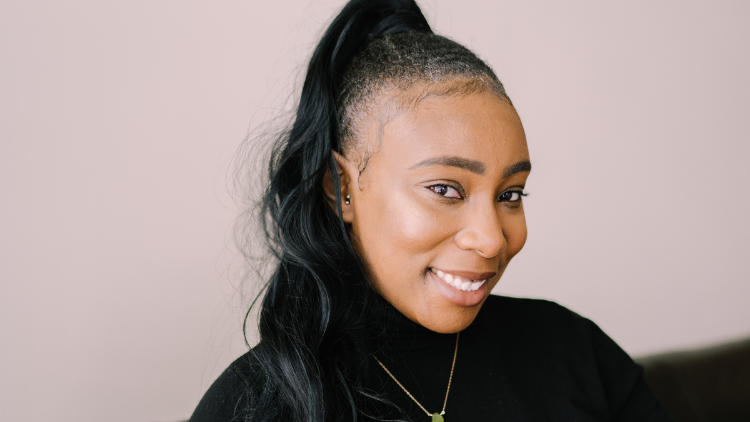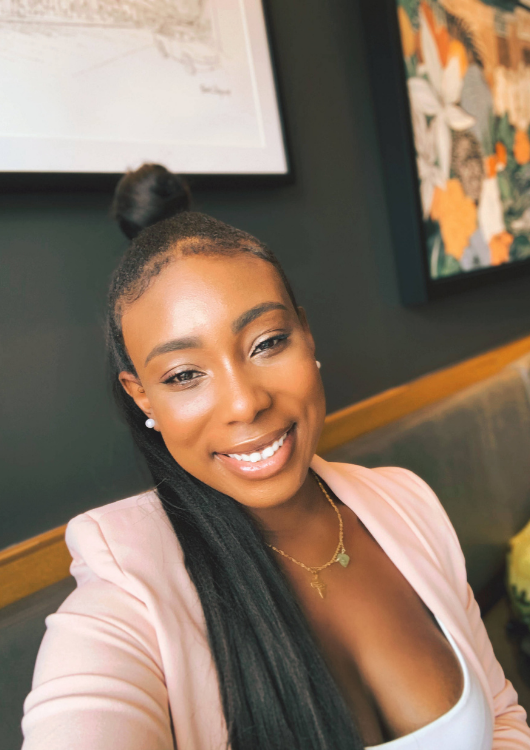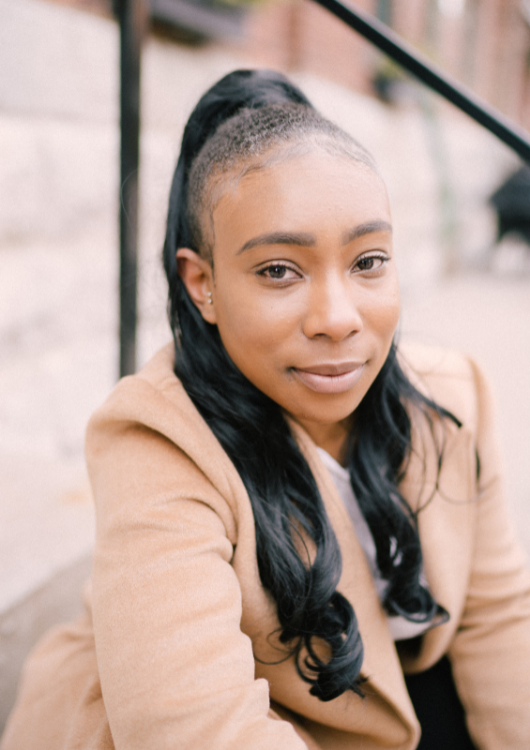September 22, 2021
Where Money and Wellness Collide: Meet Morgan Blackman, Founder of Holistic Bucks
By Emily Merrell
Imagine if money was part of your holistic wellness journey? That it was just as important as you taking care of yourself and cherishing it and nourishing it the same way you did your mind and body. Morgan Blackman of Holistic Bucks does just that. She marries all parts of your journey together. Learn more how Toronto based Morgan Blackman started investing and teaching others.

SDS: Your company Holistic Bucks integrates financial wellness with mental and physical wellness. How do you see them intertwining?
MORGAN BLACKMAN: The biggest thing that people need to take into consideration when it comes to improving their overall financial well-being is that a lot of the financial decisions you’re making on a day-to-day basis are directly correlated to the emotions sitting in the driver’s seat at that particular point in time.
Based on some scientific studies, you’ll find common statistics stating that 95% of our thoughts are subconscious and 80-85% of these thoughts are negative. So, you can imagine the things we are telling ourselves about our money situations on a daily basis, and how this negative self-talk fuels our anxiety, worries and fears.
When you are making decisions with these extremely heightened and low vibrational emotions at the forefront, you are not going to be making the best decisions for your money or your life. Don’t be hard on yourself though – as said, a lot of this is unconscious. When I realized that a lot of these decisions were actually pre-meditated based on my state of mind going into a situation, it made me really realize that there must be a similar negative story that so many people are telling themselves about money.
These limiting stories and beliefs are then subconsciously being played out in everyday lives, based on the actions that people subconsciously take and therefore manifest in their current realities. These are the actions people inevitably take that keep them feeling stagnant, stuck and hopeless in the face of adversity. These are the actions that force people to make impulsive decisions. These are the actions that force people to play small.
What people soon realize is that dealing with money isn’t just about budgeting, numbers and making a lot of money. A lot of it is actually addressing the limiting beliefs that are holding you back. That is when you’ll start to realize and see that there’s a much bigger picture going on, than just money itself. You cannot tackle the topic of money without tackling your mindset and how you are choosing to practice self-awareness on a daily basis, so that you can regulate your emotions and make decisions from a more optimal place.
I’m in no way saying that you’re supposed to be happy 100% of the time, but you are supposed to be able to identify the moments where negative self talk is present, and is not needed. Identify the moments where you are feeling the weight of some heavy negative emotions, sit through them and then let go and decide in that moment to create a new story. There’s power in knowing that you don’t have to succumb to your limiting beliefs or the fear, doubt, worry and anxiety. You can decide that you’re going to take a positive step forward and see things in a different light. You’re going to take a positive step forward and learn something new today about your money. You’re going to take a positive step forward and ask for help.
And I think it’s in making these optimal choices everyday, with focused intent and persistence, that you will eventually come across change. It is at the crossroads of financial literacy and mental capacity, where the two can intersect and provide tremendous opportunities for growth in one’s ability to build out wealth and abundance.
SDS: You’ve been investing for the past 4 years and obsessing over various stocks. For those who are new to investing, where do you recommend they get started?
MB: For those who are new to investing, I would highly recommend that you follow somebody who is knowledgeable about investing and gather as much information you can about the stock market before you start. The stock market should not seem like a place where you go to gamble. There is nothing to fear if you go in with a strategy, long-term plan and expert support along the way.
I truly believe that knowledge is power and when it comes to financial success. Most people don’t have the amount of literacy needed to match their goals and desires. You can join financial wellness groups online, web search, listen to podcasts, YouTube channels, etc. There are so many ways to educate yourself about money and how it works. When I started my financial journey, I started by reading books and I’m someone that naturally loves reading. I started reading up on famous investors and their investment strategies that successfully made them millionaires. I really loved learning about Warren Buffett – the greatest stock trader of all time – to try and mimic what he did to become the successful trader he is today.
There is so much information out there that can help you go a long way in laying out the map towards your version of financial success. However, it is important to know that a lot of information out there is inaccurate or too generic to address your own particular situation. Also, only 10% of DIY investors actively beat out the stock market (yes, I’m one of them) which means you’re better off having your investments managed for you. This is why after doing your own research, the second thing you should do is speak with someone knowledgeable about your plans for retirement. This can be done in two different ways: 1) Set up an appointment at your local bank and speak to a financial adviser or 2) Seek out an online investment platform like a robo-advisor and have their automated AI system create a customized portfolio for you.
When you have someone else manage your investments, you leave less room for error and focus more of your time and effort on acquiring more income and assets. Most managed investment platforms (or advisors) will ask you specific questions about your financial goals, how much money you have to invest, how much you’re starting with and what your level of risk is. These are questions that are going to be really important to know before going into the stock market and investing your money.

SDS: I’d like to dive further into the idea of financial wellness – what does that mean and what are the steps to get started?
MB: To me, financial wellness is the mindset piece to addressing your finances and also the steps that you are taking to stay on track towards your goals. Goal setting is definitely going to play a large part in this. If you are someone who is not regularly assessing your finances and regularly tweaking your goals to see how close you are to paying off your debt, your emergency fund or reaching that million dollar retirement, you’ll constantly be left in the dark and not know how to make the best decisions.
I’ve noticed that most people who aren’t practicing healthy financial habits are usually the ones who tend to avoid their finances. This would be people who don’t have a budget or people who aren’t laying down the grounds for a solid financial game plan and don’t have all the systems or structures in place. If you don’t know much about money and understand the system and how it works, then how could you possibly win? How could you possibly win if you’re not even playing the game? This is where I think education becomes critical to your success. You need to really work on your relationship with money.
Most of us see money as our #1 enemy, but it really is just a resource that allows us to acquire things that we need and to trade out for things that we don’t. At the end of the day, it’s up to you to decide how many resources you need based on your own specific circumstances and what you need to do to get there. For example, if you don’t have a job, then you need to look at finding a job. If you do have a job and it’s not paying you enough, then you need to look at ways to increase your income. You could be realizing that no matter how much money you make, you’re still in the same boat trying to keep up with your expenses – then the question becomes why are you overspending and what voids are you trying to fill?
Many don’t see the correlation between when you’re stressed and the amount of increased financial activity that goes on in their bank account. Those who are stressed and anxious tend to have more financial problems and debt than those who don’t. There’s a method to this madness and why I stress so much the importance of financial wellness and our mental health.
Financial wellness is self-awareness and being self-aware of every decision that you’re making around your finances, and being able to determine within that moment if that particular decision will benefit you or hold you back. Once you start to realize the areas where you are holding yourself back, it’s easier to start making changes and prioritize your health so that your behaviours can be reflected in the goals you are then able to achieve.
SDS: What is the biggest surprise you see when talking to people about their finances?
MB: I think the biggest surprise to me is just how many people still don’t understand how money works. I know it really shouldn’t be all that surprising to me as a holistic wealth coach who has been investing for almost five years. It’s more of a disheartening surprise to know that so many people are still left in the dark.
Many of us didn’t learn enough about the financial basics in school, and even worse, didn’t have the best parental example of how to manage our money either. If you weren’t fortunate enough or privileged enough to grow up in a wealthy family, where all of this valuable knowledge is passed down, you’re pretty much kept out of the loop. You also probably picked up pretty poor financial habits and behaviors from your parents and beliefs about money from your parents that are very limiting. Beliefs that make you see money as the enemy and therefore kind of keeps you in this state of victimhood or even finds you justifying your self-sabotaging behaviours.
It’s so easy to blame our misfortunes on money not being there for you and having a lack of financial support, so much so that this blaming sounds almost similar to how we would treat a significant other in a relationship. A lot of the times you point fingers at other people for what they are doing wrong, but we aren’t as quick to point fingers back at ourselves and ask where our own lack of accountability plays a part. What actions am I not taking? What are the beliefs that I have that are actually limiting my ability to see progress and instead are subconsciously helping to sabotage a lot of the opportunities present in my life? These are some of the questions we need to honestly ask ourselves, and if we are honest, realize that there is both some internal and external work to do.
That is why I feel like it’s my duty to educate people on their money so that they can do better with what they need to know. How can somebody make better decisions, if they don’t know what that better decision even is? If people can take the time to know more and seek support, they can start to feel more empowered around their financial situation and feel like there’s hope. It’s just giving people a little glimmer of hope that I think has spoken to the success of Holistic Bucks and the women I am able to help.
SDS: What piece of advice do you have for individuals wanting to take control of their finances?
MB: I actually don’t really like using the phrase “take control” because I feel like there’s some danger in wanting to control everything, right? We cannot control everything in our lives and sometimes trying to control things is also a means to resisting change. So for me, I think the best outlook to have in regards to your money is to release control. Release the outcome and release control over having to have everything go your way.
In the end, I think what’s more important when it comes to tackling your finances is to be prepared. I think people look at me and see this successful Black woman who got “lucky”, but I’m not lucky or smarter than you or was born into wealth. Bad things still happen to me, but I prepare for them. This is the opposite of how many people confront their finances. They are reactive to the uncontrollable events that occur, instead of being proactive when they show up.
It’s also not always about how much money you have that allows others to get ahead. People tend to forget that wealthy people still have certain types of debt, and there are some who are on the verge of bankruptcy or going to jail for not paying their taxes. Many rich and wealthy people still have big decisions to make, with big expenses and costs at bay. It’s about what you do when you have the money, so that if there ever comes a point in your life where you don’t have enough – you planned adequately to feel supported during those times.
I love when I have women come to me saying things like, “Morgan, I’m coming to you at this time because I’m making more money than I probably ever have in my whole life”. Or, “I just got promoted”, and “I have a better job”, and they don’t want to make the same mistakes they were making when they were earning $10,000 less. They are making probably thousands of dollars more a year, and they want to make better decisions with their money. Million dollar decisions! They want to change their poor financial habits into healthier ones, and their mindset as well. These women start to realize how important it is to be proactive when it comes to their finances, instead of reactive.
This is why as a coach, it’s my job to help you call out the patterns of behaviours that need shifting, so that you are less reactive when making financial decisions and more proactive knowing that emergencies will arise and you are prepared. If you’re persistent enough, and you continue to apply this mindset and attitude towards your finances for as long as you can, you will inevitably start to see success.

SDS: Where can people find you and what are you currently offering?
MB: I am always so excited for the offerings that I’m creating. Right now I have spots open for my 6 month coaching program, The Wealth Well. This is private coaching for heart-led business women and career leaders who really want to take their finances to the next level. They really want to embody a millionaire mindset, lay out a solid financial foundation and start building wealth through investing and other wealth generating strategies.
I also have smaller offerings to make things accessible for other people in different places along their financial journey. In addition to The Wealth Well, I offer my Broke to Woke calls which are really just 1-hour strategy calls where I do a complete audit of your finances.
I also just rolled out a course for my Broke to Woke series. This course is a seven day email course that shows you how to best build out a solid financial foundation and a complete picture of what it would look like to build a life of wealth and abundance. I cover everything from your money mindset and manifestation all the way to investing and other wealth generating strategies.
You can find more information about my work at www.holisticbucks.com and follow me on Instagram @holisticbucks.


